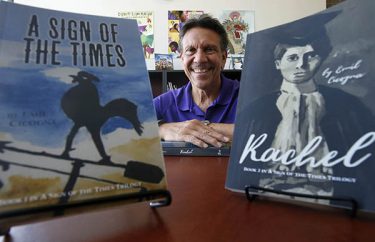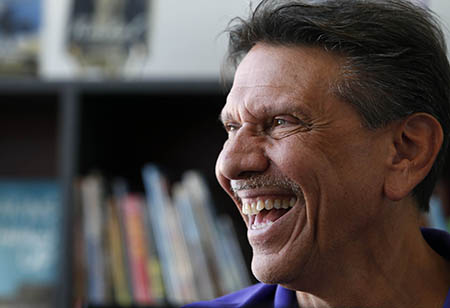
Story by Mike Kilen
Photos by Ralph Freso
GCU News Bureau
Emil Cicogna’s books were displayed behind him, on top of a library shelf at Grand Canyon University, when his mind took him back to New York City, where he grew up.
The neighborhood boys had been out playing ball and asked him where he’d been.
“In the library,” he told them.
They were confused. “What were you doing there?”
“Reading.”
His love of libraries has never waned.
For the first time, Cicogna’s own books recently were placed in one, the Lopes For Literacy Multicultural Library at GCU, where he is an Online Fulltime Faculty member of the College of Education.
It’s where he tells teacher candidates the value of stories in their classroom and the value of teaching many subjects through literature.

His young adult historical trilogy “A Sign of the Times,” “Rachel” and the forthcoming “The Hammer & the Anvil” from Flint Hills Publishing tell U.S. history from the Industrial Revolution to the roaring ‘20s through a family’s story.
Cicogna is a gregarious storyteller, and his own narrative begins with boyhood library days and opening a set of Rudyard Kipling books for Christmas. At age 30, he abruptly left a Wall Street job to teach in a Bronx high school and immediately felt at home.
“I knew right away,” he said, “and I don’t know why.”
In those classrooms, he found stories and their connection to history.
While taking his own two children to Busch Gardens in Williamsburg in 2005, they ventured through the stables of the Clydesdales, prominent in television ads, and just beyond it to a museum.
He stopped dead in front of a glass case of blacksmith tools used for shoeing horses.
“I almost fainted and cried at the same time,” he said.
There was a rush of recognition.
The tools were the same ones his father had at home in a box, given to him by his grandfather, a blacksmith in Italy. He never knew what they were before. He thought of his own grandfather, who died at age 38, the Industrial Revolution leaving him — and blacksmithing — behind.
“Oh my God,” he remembers thinking, “I’ve got to write about this.”
History unfolded in his research. For thousands of years, civilization grew at the hand of blacksmiths.
Thus began the fictional story of the Collier family in “A Sign of the Times,” published in 2016. The father was a blacksmith in 1885, but as the world of production changed, so did culture. Education was first brought to rural Pennsylvania with a one-room schoolhouse, and the lives of his children also would change.
“What do we still tell kids today? Learn the emerging technologies of the day or get left behind,” he said.
By the second book in the series, published in 2019, Rachel becomes a schoolteacher. She would endure life at the turn of the 20th century as her husband went to fight in World War I.
“The whole premise of these books is teaching history through literature,” Cicogna said.
That became paramount when he moved to Arizona after teaching for 14 years in New York City. At Barry Goldwater High School, he found many students had little interest or skills to read books, which is tough when you are teaching 10th grade reading.

So he decreased the reading level of the books to eighth grade, then seventh and, finally, fifth.
And asked students if they were interested in reading his yet unpublished book.
“You wrote it?” asked a boy in the front row.
“I wrote it.”
“I’ll read it,” the boy said.
Others quickly agreed, and Cicogna printed out copies for everyone in class, telling them that they would do nothing else until it was finished.
The students were captivated, he said. They learned that once the process of making steel was modernized, blacksmiths were losing jobs. And by 1886 Karl Benz turned the crank on an internal combustion, gas-burning engine that would change life forever in automobiles.
The 10th-grade reading classes learned about it all through the life of the families of rural Pennsylvania and characters their own age.
“They were all in,” he said. “Half of them said they had never read a whole book before.”
The reaction led to Cicogna finding a publisher and producing a study guide for teachers, complete with links to make the information interactive, such as a website that covers the history of the blacksmith trade.
His third book, which is expected to be out in the next few months, details the era of newspaper prominence and impetus for more education. Back in the 1920s, if you wanted to find out what was going on, you had to be able to read a newspaper.
It also delves into the stories of the families’ men who came back from war with post-traumatic stress, which wasn’t the term for it then. In one class, half the students raised their hands when he asked if they knew someone who had returned from a war.
“Read it in a book and it brings it to life,” he said. “You’ve got to make it relevant. And I want people to know that this happened – and is still happening today.”
In those books, they find ethics and empathy – and understanding, even of subjects like schoolyard bullies or battle-wary war veterans.
After Cicogna joined GCU nine years ago, he began to stress the value of literature to teachers-in-training.
The most frequently asked question in his EDU 330 class: “What do you do for an ice-breaker?”
Tell stories.
He shares stories of his family’s favorite holiday traditions and asks students for their own. “Children all want to share their relationships.”
He also tells his University class to have novels and nonfiction literature of many reading levels in their classrooms and use them to teach. A textbook doesn’t always thrill students.
Cicogna has appeared at homeschool conventions and talks with schoolteachers nationwide about using his books. While he finishes the third book in the trilogy and begins another nonfiction book on dropouts, Cicogna began to connect his 30-plus years of teaching to the recent day at semester's start when his books were placed atop the shelf at GCU.
His books were in a library, a place that brought him back through time and into the future with its stories.
Grand Canyon University senior writer Mike Kilen can be reached at [email protected] or at 602-639-6764.
***
Related content:
Emil Cicogna: Author website, book orders
GCU Today: New library, classroom set to create ‘teacher leaders’
GCU Today: GCU graduates become neighborhood teachers
GCU Today: Alum used writing to help students during pandemic















